
News
Critical Island Studies Reading Group on Southeast Asia
presents
Archipelagic Flows in The Elixir
We are pleased to invite everyone to join the Critical Island Studies Reading Group, scheduled on 30 January 2026, 6:00–7:30 PM (Jakarta Time). This monthly event forms part of the ongoing collaboration between the Critical Island Studies (CIS) Consortium and Kritika Kultura (KK).
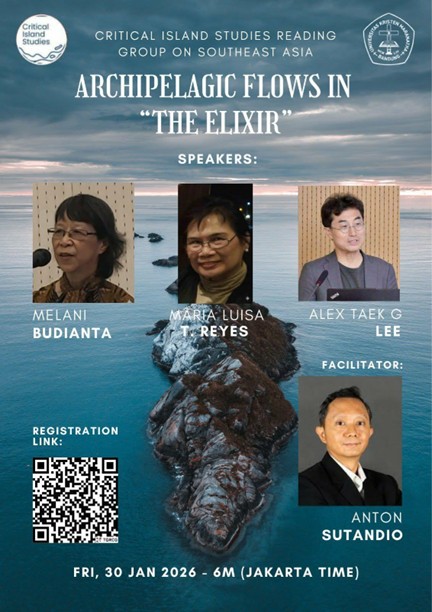
For this session, the group will discuss the film The Elixir alongside selected theoretical texts, namely Édouard Glissant’s Poetics of Relation and Dag Yngvesson’s "Prologue" in Archipelagic Cinemas: Screening Southeast Asian Modernity. The discussion aims to explore questions of archipelagic thought, relationality, and cinematic modernity in island and Southeast Asian contexts.
Those interested may register through this link:
https://tinyurl.com/CISReadingGroup
The Critical Island Studies Consortium (CIS) is an academic network dedicated to challenging prevailing modes of knowledge production centered around the Northern Hemisphere. It aims to explore the epistemological and ontological underpinnings of emerging knowledge paradigms.
Discussions on globalization often center on the expansion of Europe and North America, sidelining other regions and establishing these areas as the “center” while characterizing the rest of the world as the “margin.” However, this perspective is problematic as it neglects the interconnected nature of the global system. To foster a fresh understanding of the environment and nature, it is imperative to move away from this Eurocentric viewpoint and embrace a more planetary outlook. This shift becomes crucial in addressing pressing challenges related to social and environmental crises. Archipelagic thoughts present a potential alternative to the prevalent Eurocentric cosmology of nature, focusing on oceans and islands instead of land and continents. This approach offers the possibility of envisioning and crafting a more sustainable future for our planet.
Hence, a planetary perspective is essential for reshaping the image of the environment and fostering a new sense of nature. This transformation requires challenging established norms and adopting new perceptions, a responsibility that academia can fulfill. Until now, the Eurocentric cosmology of nature, rooted in landscape epistemology, has maintained geopolitical privilege over other regions. To counter this predominant nature narrative, an alternative environmental philosophy, such as seascape ontology, must be created. The paradigm shift from land to ocean, from continents to islands, is a crucial aspect of this transformation. Critical island studies emerge as a theoretical domain challenging geopolitical analyses, focusing on the unique characteristics and experiences of islands across interdisciplinary fields like geography, anthropology, sociology, and political science.
In contrast, geopolitical studies concentrate on the political and strategic importance of geographical space, exploring how a region’s geography can influence its political and economic relationships with other countries. While there may be some overlap between critical island studies and geopolitical studies, they are distinct disciplines with different emphases and goals. Critical island studies primarily seek to understand the distinctive experiences and challenges of islands, incorporating archipelagic thoughts, while geopolitical studies prioritize the political and strategic implications of geographical space.
To know more about CIS, you may visit https://criticalislandstudies.com/.
Kritika Kultura hosts lecture by Vicente L Rafael on Frantz Fanon
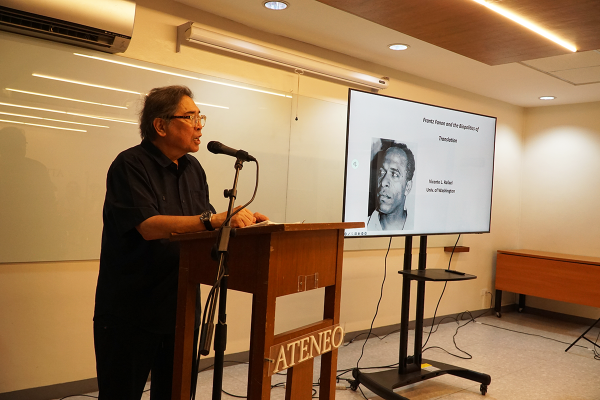
Kritika Kultura, in collaboration with the Literary and Cultural Studies Program and Ateneo Institute of Literary Arts and Practices (AILAP), recently hosted a lecture by Vicente L Rafael PhD, titled "Words the Color of Pulsating Flesh: Frantz Fanon and the Politics of Translation."
Dr Vicente L Rafael is Professor of History and Southeast Asian Studies at the University of Washington in Seattle. He received his Bachelor of Arts in history and philosophy from Ateneo de Manila University in 1977 and his PhD in history from Cornell University in 1984. He is the author of The Sovereign Trickster: Death and Laughter in the Age of Duterte (2022); Contracting Colonialism: Translation and Christian Conversion in Tagalog Society Under Early Spanish Rule (1988/1993); White Love and Other Events in Filipino Histories (2000); The Promise of the Foreign: Nationalism and the Technics of Translation in the Spanish Philippines (2005); Motherless Tongues: The Insurgency of Language Amid Wars of Translation (2016), all published by Duke University Press and co-published in the Philippines by Ateneo de Manila University Press.
In addition, Dr Rafael has also written op-ed columns for Rappler and the Philippine Daily Inquirer , as well as The Atlantic and The New York Review of Books .
Dr Rafael was accompanied by his wife, Lila Ramos Shahani, former UNESCO National Commission of the Philippines (UNACOM) Secretary General and former Assistant Secretary at the Department of Foreign Affairs.
Opening the event was Patricia P Lambino, PhD, Dean of the School of Humanities, who welcomed Dr Rafael and Ramos Shahani, thanking them for taking time out to come to Ateneo for Dr Rafael to give his lecture.
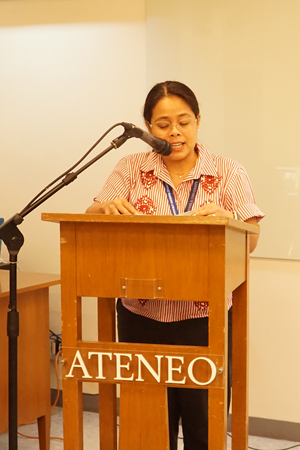
Dr Rafael's lecture focused on the writings of Frantz Fanon and how specific biopolitical and necropolitical formations in colonial translation can be found in these, especially concerning language, race, and decolonization.
Frantz Omar Fanon was a French West Indian psychiatrist and political philosopher born on 20 July 1925 in Martinique, then a French colony, and now a department of France. A political radical and Pan-Africanist, concerned with the psychopathology of colonization and the human, social, and cultural consequences of decolonization, Fanon has been described as the "the most influential anti-colonial thinker of his time." His life and works have inspired national liberation movements and other freedom and political movements in Palestine, Sri Lanka, South Africa, and the United States.
In his lecture, Dr Rafael showed pointed out some of Fanon's thoughts on language and meaning when faced with the realities of colonialism and racism, where a person of color, such as Fanon, is seen as inferior.
In particular, Fanon noted the irony that while learning the colonizer's language can show the the colonized can be the intellectual equal of the colonizer, it still plays into the idea of the colonizer and their language and culture being superior.
"To speak means to be in a position to use a certain syntax, to grasp the morphology of this or that language," he quotes Fanon. "But it means above all to assume a culture, to support the weight of a civilization."
In addition, he shared not only excerpts from Fanon's own writing, but also quotes from people close to him, to further illustrate Fanon's experiences as a person of color living in then-colonial Martinique.
After the lecture, Dr Rafael posed for a photo with some members of the audience. A simple merienda was also served for the guests.
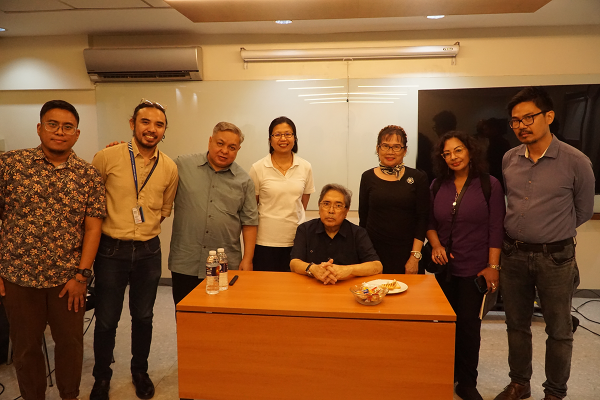
Finding beauty in the mundane: Kritika Kultura Reading Series with James Shea
On 14 January 2026, Kritika Kultura, in collaboration with the Literary and Cultural Studies Program, the Ateneo Institute of Literary Arts and Practices, the Department of Fine Arts, and PLUME, held its first Reading Series of the year, “A Conversation with James Shea,” featuring James Shea of Hong Kong Baptist University, with discussants Nikka Osorio Abeleda and Abner E. Dormiendo.
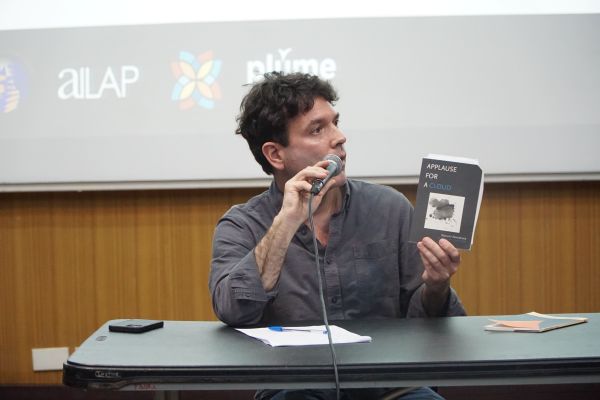
James Shea is the author of Last Day of My Face (University of Iowa Press), winner of the 2024 Iowa Poetry Prize, as well as two previous poetry collections. He has translated and co-edited several major works of contemporary poetry and haiku. Shea is also the director of the International Writers’ Workshop and the bilingual creative writing program at Hong Kong Baptist University, and a recipient of grants from the Fulbright U.S. Scholar Program, the National Endowment for the Arts, and the Vermont Arts Council.
Shea opened the reading with a poem from Applause for a Cloud (Black Ocean), a collection of contemporary Japanese haiku by Sayumi Kamakura, which he translated. He then shared selections from his own work, reading poems from “Voyage,” “Wake,” “Bicycles,” and an excerpt from “Open-Source Apology,” all from his award-winning collection Last Day of My Face.
Following Shea’s reading, Nikka Osorio Abeleda presented two poems, including “Albatross” and “The Letter Writer,” after which Abner E. Dormiendo shared two poems in translation: “In Antipolo, You Could Find a Museum” and “Bug.”
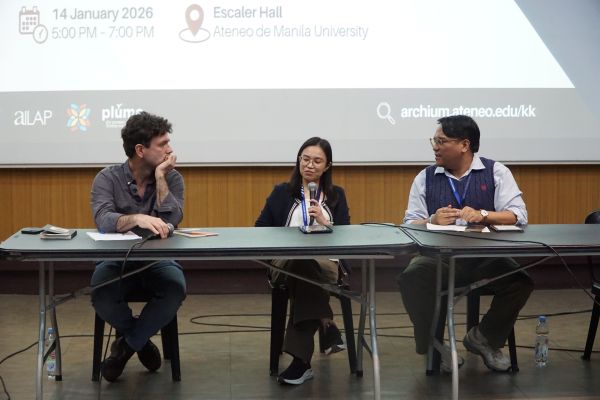
After the readings, Shea discussed the inspirations behind his work. He shared that his first book was heavily influenced by his travels in Japan, while his second drew from Chinese literature and culture. Reflecting on his third book, Last Day of My Face, he noted that thoughts of mortality were central to his creative process.
Describing his poems as meditative, Shea reflected on his contemplative approach to writing and highlighted that only a small portion of international literature is translated into English. He also revealed that he is currently working on new translations haiku from the 1920s by Ozaki Hōsai.
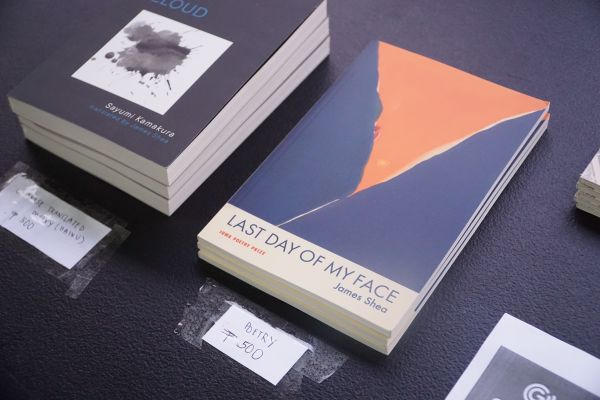
The event concluded with a Q&A session with students and faculty. One question from an AB COM student particularly resonated with the audience: Can poetry created by generative AI truly be called poetry, or does poetry require humanity?
Dr Vincenz Serrano, Editor-in-Chief of Kritika Kultura, delivered the closing remarks.
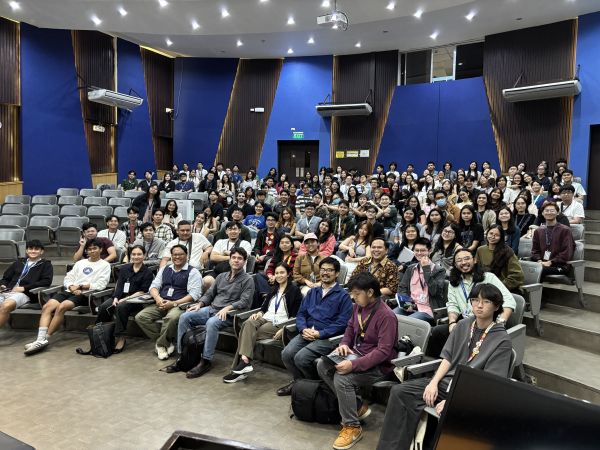
Kritika Kultura is acknowledged by a host of Asian and Asian American Studies libraries and scholarly networks and indexed in the MLA International Bibliography, Arts and Humanities Citation Index (Clarivate), Scopus, EBSCO, the Directory of Open Access Journals, and the International Consortium of Critical Theory Programs (ICCTP). Read KK issues and learn about submission guidelines and events on https://archium.ateneo.edu/kk or email the editors at kk@ateneo.edu.
CALL FOR SUBMISSIONS: Kritika Kultura Special Literary Section on Filipino Literature in Translation
The past five years have seen a rise in translation of Filipino literature to English, with the publication of the landmark anthology Ulirát: Best Contemporary Stories in Translation from the Philippines (2021); English translation of Filipino classics such as Lope K. Santos’s Banaag at Sikat (1906) and Amado V. Hernandez’s Mga Ibong Mandaragit (1969); as well as special folios highlighting Filipino literature in translation in journals such as ANMLY, Loch Raven Review, and Shenandoah. These recent productions crucially differ from earlier efforts, such as those by Marne Kilates, Rosario Cruz-Lucero, and Soledad Reyes, primarily in terms of their chosen area of circulation, namely the larger Anglophone world beyond the Philippines, the entry into which has been largely made possible by the growing interest on works coming from the Global Majority, made evident by prizes and grants catering specifically to such texts.
While the pursuit of this circulation path, with its projected wider readership, can be argued as important to, if not the point of, the work of translating Filipino literature to English, it has been also noted to incur compromises that are often left unexamined by the Anglophone world, and remain visible only from the Philippine vantage, due to the common lack of knowledge of the former regarding Philippine languages. Certainly, negotiations are inherent in any act of translation; nevertheless, it is crucial to recognize them, underscore them even, if only to articulate, however preliminarily, a certain ethic of translation that acknowledges the risks of misrepresentation and homogenization against its own promises.
Kritika Kultura, the international online journal on literary, language, and cultural studies of the Literary and Cultural Studies Program of the Ateneo de Manila University, the Philippines, opens itself thus for a special literary section on Filipino literature in English translation, guest edited by translator and critic Christian Jil R. Benitez, assistant professor of the Filipino Department, Ateneo de Manila University. As an international platform that is grounded on the Philippine context, Kritika Kultura inhabits a particular position that allows the dissemination of such texts to a global audience while insisting on, at the same time, a critical attention to the transformation of these texts, given its access to knowledge of Philippine languages and cultures. As such, Kritika Kultura may serve as a crucial space where the nuances involved in translating Filipino literature to English, especially those that only come into view when examined from the Philippine perspective, may be further explored.
This special literary section aims to gather works that demonstrate current practices in translating Filipino literature to English. It intends to show the variety of ways translators from Philippine languages mediate Filipino literature with the Anglophone world linguistically, culturally, and institutionally. What risks do they encounter in rendering Filipino texts in English? How much of a compromise is possible, and ethical? And what is the potential, if any, of unfaithfulness to the Filipino language when translating a work to English?
Interested translators may submit English translations of (a) suite of 5-8 poems or a long poem; (b) prose between 4,000 to 7,000 words; (c) one-act play, or an excerpt from a full-length play, not more than 25 pages; or (d) work in hybrid form, also not more than 25 pages. Self-translations and looser interpretations of what translation could be are allowed and even encouraged. The translation must be prefaced with: (1) 150-200-word overview of the work; and (2) 2,500-4,000-word essay that contextualizes the original work, rationalizes its choice, describes and problematizes the translation process, and responds to the aforementioned questions. Submissions must be saved as DOCX, in two copies, one with and another without the name of the translator appearing in the document, with filenames “[Translator’s last name]_[Title of the work].docx” and “[Anonymous]_[Title of the work].docx,” respectively.
Submissions must also be accompanied by the (1) the work in the original language; and (2) permission of the author of the original work, both in PDF. In the body of the email, please state that your translation manuscript is original, not currently under consideration in any other journal, and has not been published previously. Furthermore, provide a 100-150-word bionote for both the author and the translator, their institutional affiliations, if any; and professional email addresses.
Send the submission to kkliterary@gmail.com (cc: kk@ateneo.edu; cbenitez@ateneo.edu), with the header “[Translator’s last name]_[Title of the work].” An acknowledgment of submission will be sent within two weeks. All contributions must be submitted on or before February 13, 2026.
Kritika Kultura strictly publishes works reviewed by at least two referees. As an attempt to experiment with and problematize conventional peer review process, submissions that pass initial screening will undergo a small online workshop, where submitters offer comments on each other’s works, and which will serve as the first review. After revising the submissions based on the comments received, they will be sent out to referees for a second review.
Accepted works will be published in a 2026 issue of Kritika Kultura.
About the guest editor
Christian Jil R. Benitez is a Filipino scholar, poet, and translator. He earned his PhD in comparative literature at Chulalongkorn University in Thailand. He teaches Filipino literature and creative writing at the Ateneo de Manila University, in the Philippines, where he earned his AB-MA in Filipino literature. His first book Isang Dalumat ng Panahon (Ateneo de Manila UP, 2022) received the Philippine National Book Award for literary criticism and cultural studies. His translation of Jaya Jacobo’s Arasahas: Poems from the Tropics (PAWA P and Paloma P, 2024) is a finalist in the 2025 Lambda Literary Awards for transgender poetry. He was among the inaugural winners for PEN Presents x International Booker Prize, for his translation of Alvin Yapan’s Time of the Eye (Ang Sandali ng mga Mata; Ateneo de Manila UP, 2006).
The public is invited to
The Meaning of Decolonised Knowledge: Critique and Construction
by Syed Farid AlatasNational University of Singapore | University of Malaya
Part of the KRITIKA KULTURA LECTURE SERIES
To register, visit go.ateneo.edu/KKLectureAlatas.
Kritika Kultura, in collaboration with the Literary and Cultural Studies Program and PLUME, invites you to a lecture titled “The Meaning of Decolonised Knowledge: Critique and Construction,” to be delivered by Syed Farid Alatas of the National University of Singapore and University of Malaya. The event will take place on 3 November 2025, 5:00–7:00 PM, at the CTC 413, Ateneo de Manila University.
This lecture examines the diverse strands of postcolonial and decolonial thought, distinguishing between their critical and constructive dimensions to clarify what it means to decolonize knowledge and life beyond discourse. Drawing examples from different countries, it maps how varied forms of colonialism have generated distinct modes of critique and reconstruction within global intellectual traditions.
Admission is free and open to the public. Please bring a valid ID for campus access.
ABSTRACT
What has come to be known as postcolonialism, decolonial thought and other varieties of anti-Eurocentric and anti-Orientalist thought, constitute a vast and diverse body of writings across a variety of disciplines and genres. They mean many things that ought not to be conflated with each other. Indeed, it is useful to make valid distinctions in order to appreciate the meaning of the decolonization of knowledge. In this presentation I distinguish between the critical and constructive dimensions of decolonization. The critical dimension itself can be seen to consist of a number of varieties that correspond to the types of colonialism, while construction is constituted by two broad types. This presentation also defines decolonization in terms of its function, that is, the decolonization of our lives beyond the discursive.
To illustrate these varieties and dimensions, I draw on examples from 16th-century Spanish America, 17th-century India, 19th-century Indonesia and the Philippines, and contemporary Malaysia and Singapore, from among both the colonized and the colonizers.
BIONOTE
Syed Farid Alatas is Professor of Sociology and Anthropology at the National University of Singapore, and Visiting Professor at the Department of Anthropology and Sociology, University of Malaya. His areas of interest are social theory, religion and reform, intra- and inter-religious dialogue, and the study of the problems of colonial and Eurocentric knowledge.
ABOUT KRITIKA KULTURA
Kritika Kultura is acknowledged by a host of Asian and Asian American Studies libraries and scholarly networks and indexed in the MLA International Bibliography, Arts and Humanities Citation Index (Clarivate), Scopus, EBSCO, the Directory of Open Access Journals, and the International Consortium of Critical Theory Programs (ICCTP). Read KK issues and learn about submission guidelines and events on https://archium.ateneo.edu/kk or email the editors at kk@ateneo.edu.
Register here: go.ateneo.edu/KKLectureAlatas.
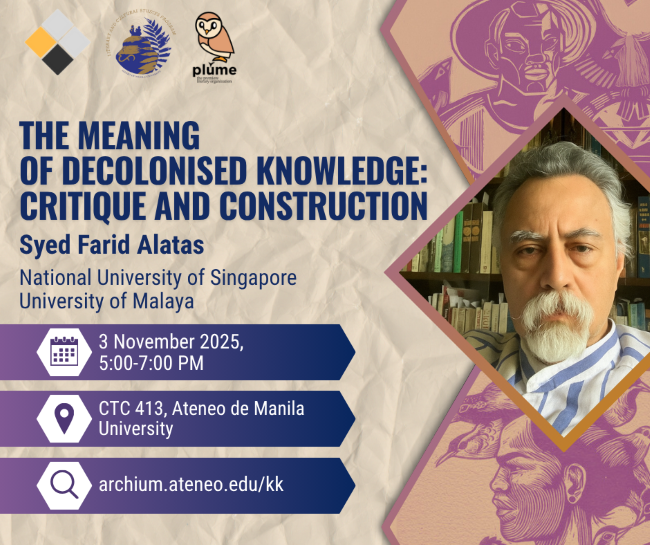
The public is invited to
On Carlos Bulosan: Writing Diaspora, Becoming Filipino
by Jeffrey Arellano Cabusao
Bryant University (US)
Part of the KRITIKA KULTURA LECTURE SERIES
To register, visit go.ateneo.edu/KKLectureCabusao.
Kritika Kultura, in collaboration with the Literary and Cultural Studies Program and PLUME, invites you to a lecture titled “On Carlos Bulosan: Writing Diaspora, Becoming Filipino,” to be delivered by Jeffrey Arellano Cabusao of the Bryant University (US). The event will take place on 10 November 2025, 5:00–7:00 PM, at the NGF Conference Room, De la Costa Hall, Ateneo de Manila University.
This lecture revisits the life and works of Carlos Bulosan to explore his enduring significance in the 21st century. Moving beyond his reputation as a writer of the Filipino diaspora, it examines Bulosan as a theorist who grappled with key “struggle concepts” such as class, culture, and identity to imagine social transformation. By rereading America Is in the Heart alongside his letters and essays, the discussion reclaims Bulosan’s intellectual legacy and affirms his relevance amid today’s digital and diasporic contexts.
Admission is free and open to the public. Please bring a valid ID for campus access.
ABSTRACT
This presentation focuses on pioneering 20th century writer Carlos Bulosan. Born in Binalonan, Pangasinan in 1911, Bulosan bore witness to the development of a working-class Filipino diaspora. By dramatizing the hopes, fears, and aspirations of 150,000 Filipino migrant workers, Bulosan’s writings embodied the “voice” of the Filipino American experience from the 1930s into the 1950s. Bulosan left our planet seventy decades ago. Does he continue to speak to us? Or is Bulosan, once again, relegated to the dustbin of history only to be retrieved as a reminder of what once was or an affirmation of “how far we’ve come”? Should we continue to read Bulosan in the 21st century, which is increasingly dominated by a “click-and-scroll” form of literacy and easy access to ChatGPT summaries on mobile devices?
To push against historical erasure or trivialization of Bulosan’s achievements, we could examine how he engages what feminist theorist Teresa Ebert calls “struggle concepts” necessary for social transformation (society, history, class, etc.). By reconsidering Bulosan’s America Is in the Heart in relation to his other writings (letters and essays), this project examines “struggle concepts” that are specific to Bulosan’s work—“writing diaspora” and “becoming Filipino.” This approach sheds light on a different aspect of Bulosan who has long been categorized as a poet, short story writer, and novelist. By considering Bulosan as a theorist who rearticulates concepts such as “class,” “culture,” and “identity,” we might appreciate his continued relevance for Filipinos everywhere in the 21st century.
BIONOTE
Jeffrey Arellano Cabusao is Professor of English and Cultural Studies in the Department of History, Literature, and the Arts at Bryant University, Smithfield, Rhode Island (US) where he teaches courses in Asian American studies, ethnic studies, literary/cultural studies, and media literacy. As editor and contributor, Cabusao published Writer in Exile/Writer in Revolt: Critical Perspectives on Carlos Bulosan in 2016 (University Press of America). He is currently on sabbatical as a Kritika Kultura Visiting Professor jointly affiliated with the Literary and Cultural Studies Program (LCSP) at the Ateneo de Manila University. Cabusao is a member of the International Board of Editors for Kritika Kultura, a co-director emeritus of the NCTE (National Council of Teachers of English) Early Career Educator of Color Leadership Award Program, and the president of the Working-Class Studies Association (WCSA).
ABOUT KRITIKA KULTURA
Kritika Kultura is acknowledged by a host of Asian and Asian American Studies libraries and scholarly networks and indexed in the MLA International Bibliography, Arts and Humanities Citation Index (Clarivate), Scopus, EBSCO, the Directory of Open Access Journals, and the International Consortium of Critical Theory Programs (ICCTP). Read KK issues and learn about submission guidelines and events on https://archium.ateneo.edu/kk or email the editors at kk@ateneo.edu.
Register here: go.ateneo.edu/KKLectureCabusao.
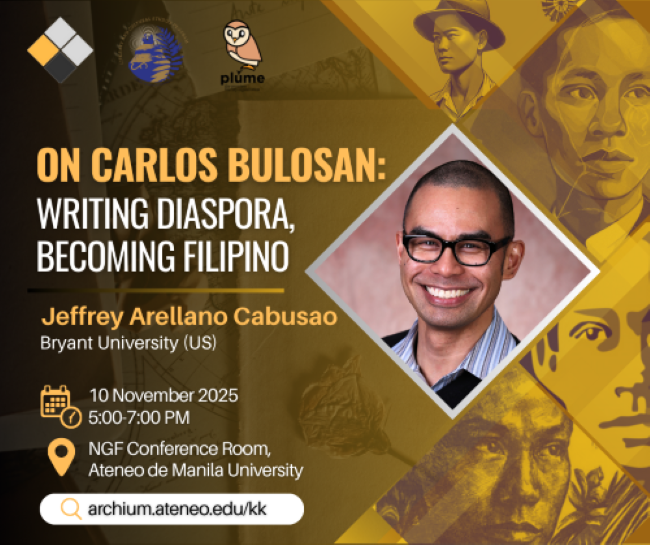
The public is invited to
From Illegible to Illicit: Anglophone Singapore Writing
from the 1970s to the 1990s
by Ann Ang
Nanyang Technological University (Singapore)
Part of the KRITIKA KULTURA LECTURE SERIES
To register, visit https://go.ateneo.edu/KKLectureAng.
Kritika Kultura, in collaboration with the Literary and Cultural Studies Program and PLUME, invites you to a lecture titled “From Illegible to Illicit: Anglophone Singapore Writing,” to be delivered by Ann Ang of the Nanyang Technological University (Singapore). The event will take place on 18 November 2025, 5:00–7:00 PM, at the NGF Conference Room, De la Costa Hall, Ateneo de Manila University.
This lecture investigates the contested beginnings of Singapore’s anglophone literary scene, focusing on how writers from the 1970s to the 1990s confronted public and political resistance amid shifting policies on language and nationhood. By revisiting this period, the talk reveals how debates on morality, culture, and linguistic identity shaped the path toward a distinctly Singaporean English writing. It concludes by examining Damien Sin’s poetics as a culmination of this contentious relationship between literary expression and state discourse.
Admission is free and open to the public. Please bring a valid ID for campus access.
ABSTRACT
While much scholarship on Singapore writing focuses on the late 1990s to the contemporary moment, discussing themes such as migrancy, globalization, minority identity and its intersections with the city’s state narrative of national survival, this talk explores the decades preceding the emergence of Singapore as a global city. Amidst the expanding study of Commonwealth writing in the 1970s, local anglophone writers in Singapore encountered an unexpected wave of resistance from state and public discourses. Taking as its starting point a parliamentary speech that labelled anglophone poets as “the arty-crafty dodgers of reality,” anglophone writers were perceived as immoral, contrarian, and uncommitted to the nation. Though the state advocated a policy of official bilingualism where English is taught as the first language, accompanied by an ethnic mother tongue, local writers were caught between cultural decolonization and the developmentalist role of standard English alongside the British literary canon. By the 1990s, however, English was increasingly the literary language of choice. But popular readership supported, instead, a burgeoning genre writing scene focusing on ghost stories and horror. The second half of the talk examines Damien Sin, musician, poet and noir writer, as emblematic of an anglophone illicitness that can be traced to earlier decades. His poetry collection Saints, Sinners and Singaporeans (1998) blends high culture elements such as the ballad form and rhyme schemes with a startling mix of subjects ranging from the devil and sex, to working class anthems and Nero.
BIONOTE
Dr Ann Ang is an Assistant Professor of English Literature at the National Institute of Education, Nanyang Technological University (Singapore). Her current research interests include comparative methods for anglophone Southeast Asian literatures, Singapore and Malaysian poetry, and ecocritical approaches to regional writing. Dr Ang’s work is published in Kritika Kultura, the Journal of Postcolonial Writing, Interventions, and Modernism/Modernity. She is also a writer of poetry and fiction, and has edited several literary anthologies.
ABOUT KRITIKA KULTURA
Kritika Kultura is acknowledged by a host of Asian and Asian American Studies libraries and scholarly networks and indexed in the MLA International Bibliography, Arts and Humanities Citation Index (Clarivate), Scopus, EBSCO, the Directory of Open Access Journals, and the International Consortium of Critical Theory Programs (ICCTP). Read KK issues and learn about submission guidelines and events on https://archium.ateneo.edu/kk or email the editors at kk@ateneo.edu.
Register here: https://go.ateneo.edu/KKLectureAng.
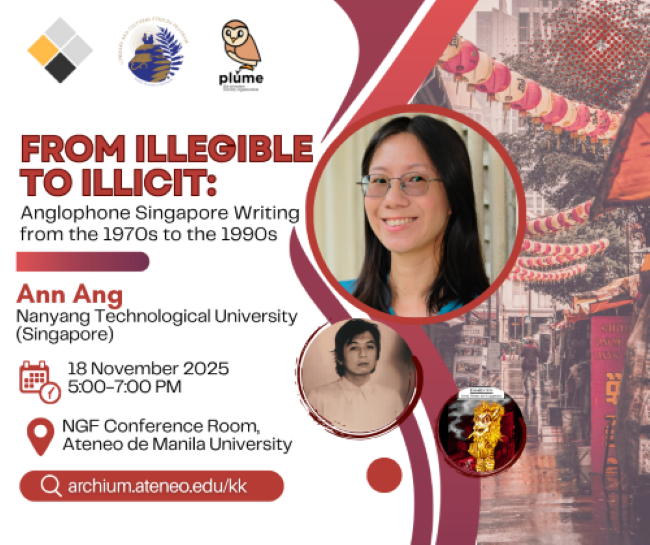
KRITIKA KULTURA LECTURE SERIES
Sandali Bilang Kontra-Naratibo: Pagbakas sa Kasaysayan ng Dagling Andergrawnd sa Panahon ng Diktadurang Marcos
(Moment as Counter-Narrative: Tracing the History of Dagling Andergrawnd During the Marcos Dictatorship)
Jomar G. Adaya
To register, visit https://go.ateneo.edu/KKLecture-Adaya.
Kritika Kultura, in collaboration with the Ateneo Institute of Literary Arts and Practices (AILAP), and Baybayin Ateneo, invites you to a lecture titled “Sandali Bilang Kontra-Naratibo: Pagbakas sa Kasaysayan ng Dagling Andergrawnd sa Panahon ng Diktadurang Marcos (“Moment as Counter-Narrative: Tracing the History of Dagling Andergrawnd During the Marcos Dictatorship”), to be delivered by Jomar G. Adaya of Polytechnic University of the Philippines. Sarah Jane S. Raymundo of the Center of International Studies-UP Diliman and Christoffer Mitch C. Cerda of the Ateneo Institute of Literary Arts and Practices (AILAP) will serve as respondents to the lecture. The event will take place on 15 September 2025, 5:00–7:00 PM, at the Escaler Hall, Ateneo de Manila University.
This lecture traces the relegated history of dagli by focusing on its reemergence and transformation during the national democratic struggle of the 1970s. While this literary genre is commonly historicized through institutional literary publications and its early 20th-century iterations, the study investigates its potency during the Marcos dictatorship. By reading the dagling andergrawnd as a counter-narrative form that disrupts authoritarian conceptions of time, the lecture offers a critical intervention in how literary forms shape political resistance.
Admission is free and open to the public. Books will be available for purchase before and after the event. Please bring a valid ID for campus access.
ABSTRACT IN FILIPINO
Taong 2007 nang ilathala ng Ateneo de Manila University Press ang Ang Dagling Tagalog, 1903-1936 na pinamatnugutan nina Aristotle Atienza at Rolando Tolentino. Masasabing naging instrumental ang aklat na ito sa paglaganap ng dagli sa mga institusyong pampanitikan sa bungad ng ika-21 siglo. Ang introduksiyon nina Atienza at Tolentino ang karaniwang ginagamit na batayan kapag tinatalakay ang pag-ugat sa kasaysayan at tradisyon ng dagli na sinasabing namayagpag sa mga publikasyong popular sa panahon ng kolonyalismong Amerikano at biglang maglalaho sa huling bahagi ng dekada ‘30, sa panahon ng paglaganap ng ganap na porma ng maikling kuwentong Tagalog. Mula sa tala ng ilan pang pag-aaral, muli raw mabubuhay ang dagli sa bungad ng ika-21 siglo, hindi na sa espasyo ng magasing popular, kundi sa lunan ng university at mainstream press. Bagama’t nabanggit sa aklat ang pagsulpot ng dagli sa mga aksyong masa ng kilusang pambansa demokratiko ng dekada ‘70, hindi na ito komprehensibong natalakay bunsod ng limitasyon ng isinagawang pananaliksik arkaybal. Maging sa sumunod na mga pag-aaral, wala pang nagtuon sa dagli na nasa lunan ng pambansa demokratikong pakikibaka. Sa ganitong konteksto, nilalayon ng panayam na maugat ang puwang sa kasaysayan ng dagli sa pamamagitan ng pagtuon sa dagling andergrawnd ng kilusang pambansa demokratiko sa panahon ng diktadurang Marcos ng dekada ‘70. Tinatangka ng panayam na ito na panimulang matalakay ang kasaysayan ng dagling andergrawnd bilang materyalisasyon ng “sandali” na porma ng kontra-naratibo na lumilikha ng antala o paghinto sa namamayaning konsepto at praktika ng “panahon” na “pare-pareho at hungkag” na nirerepresenta naman ng kapangyarihan ng diktadurang Marcos. Iginigiit ng pag-aaral na ito hindi lamang ang naging kontribusyon ng panitikang pambansa demokratiko sa paglinang sa tradisyon ng dagli, kundi higit, ang pagbabagong hubog nito sa anyo bilang “rebolusyonaryong sandali” tungo sa pagsulong ng kilusang anti-diktadura.
ABSTRACT
In 2007, the Ateneo de Manila University Press published the Ang Dagling Tagalog, 1903-1936, edited by Aristotle Atienza and Rolando Tolentino. This book may be considered instrumental in the proliferation of dagli within the literary institutions at the turn of the 21st century. The introduction by Atienza and Tolentino is commonly used as a primary reference in tracing the history and tradition of dagli, a form said to have flourished in popular publications during the American colonial period, only to abruptly disappear in the late 1930s with the rise of the fully developed short story in Tagalog. According to accounts of other studies, the dagli would re-emerge at the dawn of the 21st century—not in the pages of popular magazines, but within the spaces of the university and mainstream press. Although the emergence of dagli in the 1970s mass actions of the national democratic movement is briefly mentioned in the book, it was not explored in depth due to the limitations of the archival research conducted. Even in subsequent studies, no focused inquiry has yet been made on the dagli situated within the context of the national democratic struggle. It is within this context that this lecture seeks to trace the dagli’s historical discontinuities by focusing on the dagling andergrawnd of the national democratic movement during the Marcos dictatorship of the 1970s. This lecture attempts a preliminary discussion of the history of the dagling andergrawnd as a materialization of “moment”—a form of counter-narrative that creates a rupture or interruption in the dominant conception and practice of “time” as “homogeneous and empty,” a temporality represented by the authoritarian power of the Marcos dictatorship. This study asserts not only the contribution of national democratic literature to the development of the tradition of dagli, but more importantly, its remolding of the form as a “revolutionary moment” towards the advancement of the anti-dictatorship movement.
BIONOTE IN FILIPINO
Si Jomar Gonzales Adaya ay nagtuturo ng mga kurso sa panitikan at Filipino bilang Kawaksing Propesor sa Kagawaran ng Filipinolohiya ng Politeknikong Unibersidad ng Pilipinas (PUP). Nagsisilbi rin siyang Hepe ng PUP Sentro sa Araling Pilipino, Editor ng Bisig Journal, at Kawaksing Editor ng Entrada. Kasalukuyan kumukuha ng PhD in Philippine Studies sa Unibersidad ng Pilipinas Diliman, ang kaniyang tinatangkang disertasyon ay pagsiyasat sa kasaysayan at tradisyon ng dagling NatDem bilang anyo ng kritikang pangkultura at pampolitika. Kasapi siya ng Concerned Artists of the Philippines, PUP Chapter.
BIONOTE
Jomar Gonzales Adaya is an Associate Professor at the Kagawaran ng Filipinolohiya of the Polytechnic University of the Philippines (PUP), where he teaches literature and Filipino courses. He also serves as Chief of the PUP Center for Philippine Studies, and as Editor of Bisig Journal and Associate Editor of Entrada. Currently pursuing his PhD in Philippine Studies at the University of the Philippines Diliman, his dissertation explores the literary history and tradition of the “dagling NatDem” as a form of cultural and political critique. He is a member of the Concerned Artists of the Philippines, PUP Chapter.
ABOUT KRITIKA KULTURA
Kritika Kultura is acknowledged by a host of Asian and Asian American Studies libraries and scholarly networks and indexed in the MLA International Bibliography, Arts and Humanities Citation Index (Clarivate), Scopus, EBSCO, the Directory of Open Access Journals, and the International Consortium of Critical Theory Programs (ICCTP). Read KK issues and learn about submission guidelines and events on https://archium.ateneo.edu/kk or email the editors at kk@ateneo.edu.
Register here: https://go.ateneo.edu/KKLecture-Adaya
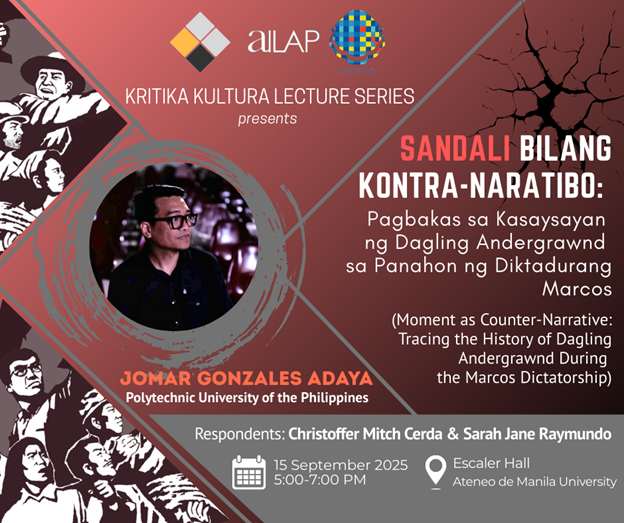
KRITIKA KULTURA LECTURE SERIES
Tidal Poetics and Archipelagic Joy: Grace Hsieh-Hsing
and the Taiwan–Philippines Literary Bridge
Rex Chien-Chou Hou
National Quemoy University, Taiwan
To register, visit https://go.ateneo.edu/KKLectureHou.
Kritika Kultura, in collaboration with the Literary and Cultural Studies Program, Ateneo Institute of Literary Arts and Practices (AILAP), and PLUME, invites you to a lecture titled “Tidal Poetics and Archipelagic Joy: Grace Hsieh-Hsing and the Taiwan–Philippines Literary Bridge,” to be delivered by Rex Chien-Chou Hou of National Quemoy University, Taiwan. The event will take place on 8 September 2025, 5:00–7:00 PM, at the NGF Conference Room, De la Costa Hall, Ateneo de Manila University.
This lecture explores the “tidal poetics” of Philippine Sinophone poet Grace Hsieh-Hsing, examining how her work transforms the Philippine archipelago into a metaphor for artistic creation and cultural identity. Through close readings of her trilingual poetry and literary networks across Taiwan and the Philippines, the lecture highlights how her voice bridges local rootedness and transnational connection amid Cold War ruptures. The talk will conclude by reflecting on how Hsieh-Hsing’s poetics continues to inspire creative dialogues–including the lecturer’s own poetic engagement.
Admission is free and open to the public. Books will be available for purchase before and after the event. Please bring a valid ID for campus access.
ABSTRACT
This lecture examines how Philippine Sinophone poet Grace Hsieh-Hsing (1938–2021) developed what I call a “tidal poetics”—a scholarly concept I propose based on close readings of her work—to describe her transformation of the Philippine archipelago’s geographic reality into a metaphor for artistic creation and cultural identity. Through depictions of Philippine foodways, customs, and landscapes, Hsieh crafted a poetics both locally rooted and transnationally connected, using “archipelagic joy” to respond to the political rupture following the Taiwan–Philippines diplomatic break.
Drawing on her posthumous Floating Life, Poetic Shadows (浮生詩影, 2023), the trilingual Halo-Halo: Poems of the Philippines (哈露·哈露——菲島詩情), and works published in Taiwan’s Sunshine Collection (陽光小集), I trace how her late-blooming career—beginning at age 44—celebrates multiplicity, fluidity, and cross-cultural pollination. Her poems on balut, kamayan, and jeepneys demonstrate how Sinophone writers develop authentic local aesthetics while maintaining transnational connections. The lecture also examines the Sunshine Collection’s “Philippine Sinophone Poetry Exhibitions”(1982–1984) as a case study in literary networks circumventing Cold War political divisions.
Combining textual analysis with literary-historical context, I reflect on how her tidal poetics continues to inspire ongoing creative dialogues—including my own poetic engagement to be shared during the lecture.
BIONOTE
Hou Chien-Chou (Rex) is an Associate Professor at the Department of Chinese Studies, National Quemoy University, Taiwan, and holds a PhD in Chinese Literature from National Dong Hwa University. A poet and Sinophone writer, he is a member of the Archipelagic Poets Society in the Philippines. His research covers Taiwanese literature, Philippine Sinophone literature, Southeast Asian Sinophone literature, Sinophone literary and cultural studies, translation and intercultural research, literary theory and criticism, as well as island literature and migration studies. He has served as Principal Investigator for projects funded by Taiwan’s National Science and Technology Council and Ministry of Education, was Writer‑in‑Residence at the National Museum of Taiwan Literature, and co‑organized the Pacific International Poetry Festival with poet Chen Li. He previously worked in the Philippines.
ABOUT KRITIKA KULTURA
Kritika Kultura is acknowledged by a host of Asian and Asian American Studies libraries and scholarly networks and indexed in the MLA International Bibliography, Arts and Humanities Citation Index (Clarivate), Scopus, EBSCO, the Directory of Open Access Journals, and the International Consortium of Critical Theory Programs (ICCTP). Read KK issues and learn about submission guidelines and events on https://archium.ateneo.edu/kk or email the editors at kk@ateneo.edu.
Register here: https://go.ateneo.edu/KKLectureHou
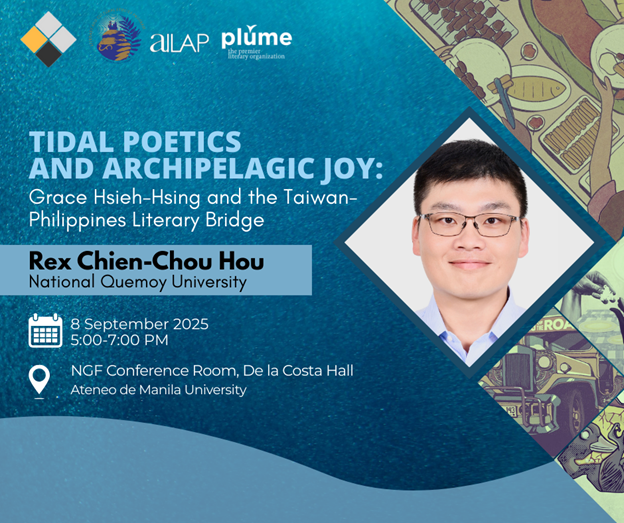
Kritika Kultura proudly announces the release of its 47th issue (July 2025). Composed of 16 entries, KK 47 may now be read on Archium.
The regular section, edited by Ma. Gabriela P. Martin and Jocelyn Martin, includes six essays that address a wide range of themes and critical concerns. Fen Gao and Pengfei Zhang explore the interrelation of artificial intelligence, literary studies, and ‘brain text’ in their article “Literary Study in the Era of Artificial Intelligence in China.” Chun-Mei Chuang’s “Love Is a Molecular Island” probes the intersections of affect and nonhuman affinity, proposing a ‘planetary art machine of Cosmos’ that redefines theory as a generative and cosmopolitical process. Taehee Kim, in “Maritime (Im)Mobility and Heterotopia: Jeju Island in South Korea,” offers a critical reading of island spaces as both a refuge and a site of voluntary exile while exposing the disillusionment that emerges as these idealized representations confront the realities of capitalist modernity and maritime (im)mobility. E. San Juan, Jr.'s “In Quest of the ‘Sublime Paralytic’: Speculations on History, Identity, and the Emergence of National-Class Consciousness” revisits Apolinario Mabini’s revolutionary thought as a foundational articulation of Filipino popular sovereignty, tracing how he merged Enlightenment ideals with indigenous communal ethics to envision a national-democratic project that continues to resonate in contemporary struggles against neocolonialism. Xiaoxiao Huang, in “Neoliberal Society, Alienation, and Affective Crisis in The Answers (2017),” reimagines Marx's theory of alienation to reveal how neoliberal capitalism restructures intimacy and emotional labor, exposing the gendered and classed affective crises intensified by systemic precarity. Lastly, Christian Jil R. Benitez turns to cinematic ecologies in “A Verdant Reading: On the Agency of the Nonhuman Landscape in Apocalypse Now (1979),” to argue that the landscape functions not merely as backdrop but as an active, nonhuman agent in the film’s production, disruption, and interpretation.
Guest edited by Biwu Shang and Maria Luisa Torres Reyes, the Forum Kritika on Nonhuman Narrative in World Literature features ten articles: a guest editors’ introduction, followed by:
- “Encountering the Non-Human with Narrative Form: J.M. Coetzee’s The Lives of Animals” by Yafei Li;
- “Beyond the Fermi Paradox: Alien Narratives and Chinese Epistemology in Liu Cixin’s Science Fiction” by Siqi Zhao;
- “Making the World of Connections Visible: Nonhuman Narrative as World Literature” by Zou Li;
- “Towards an Envisioned Human-Nonhuman Community: The ‘New Human’ Narrative and Ethical Choice in Wang Jinkang’s The Artificial Human” by You Wu;
- “Luck as Power: Nonhuman Game Narrative, Agency, and Alien Colonization in Philip K. Dick’s The Game-Players of Titan” by Kanjing He;
- “Pain, Pleasure, Preference: ‘Consider the Lobster’ and Dilemmas of Animal Narratives” by Xiaomeng Wan;
- “From Clones to Robots: Kazuo Ishiguro’s Non-human Narrative and Its Ethical Implications” by Minrui Li;
- “Rethinking Human/Nonhuman Hierarchy in Charlie and the Chocolate Factory” by Xinyue Yuan;
- “How Should We Get Along? Non-human Narratives in Anthony Browne’s Picture Books by Hongbo Lyu.”
As framed by the guest editors, these papers offer “diversified perspectives on nonhuman narrative . . . [that] attempt to do new readings of narrative texts and to reconsider and evaluate the human-nonhuman relations.”
Acknowledged by Asian and Asian American Studies libraries and scholarly networks, Kritika Kultura is indexed in the MLA International Bibliography, Arts and Humanities Citation Index (Clarivate), Scopus, EBSCO, the Directory of Open Access Journals, and the International Consortium of Critical Theory Programs (ICCTP). Kritika Kultura is published thrice a year by the Literary and Cultural Studies Program in the School of Humanities, Ateneo de Manila University, and is a founding member of the Asian Journals Network. For inquiries, please contact the editors at kk@ateneo.edu.
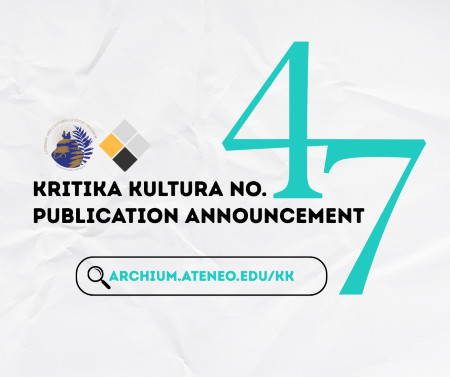
- Kritika Kultura Lecture
- Call for Contributions
- Suite of 3 to 5 poems or a long poem
- Short story
- Excerpt from a novel (please include a brief overview of the novel’s project)
- Literary essay
- The work in its original language
- Proof of permission of the author of the original work (if it is not in the public domain or if it was not authored by the translator themselves)
- An accompanying essay (1,000 to 2,000 words) that covers but is not restricted to the following:
- Background of the author and text being translated
- Rationale behind the choice of text
- Translation theory and method used
- Aesthetic, political, cultural, and/or institutional concerns encountered in the course of the translation
- Background of the author
- Thematic, aesthetic, political, cultural, and/or institutional concerns reckoned with in/through the work
- Texts that influenced the work
- Email Subject Heading: Author’s last name_Genre of work_Title of work
- Email Body: Brief bionote (100 to 150 words), as well as your institutional affiliation and professional email address.
- Attached Document Filename: Genre of work_Title of work
- Attached Document Content: The literary work with the author’s note (100 to 200 words) at the end. Author’s name should not appear anywhere in the document.
- Attached Document Format: .docx and/or .pdf
Kritika Kultura, in collaboration with the Literary and Cultural Studies Program and PLUME, invites you to a lecture titled “𝗥𝗲𝘃𝗶𝘀𝗶𝘁𝗶𝗻𝗴 𝗔𝘀𝗶𝗮 𝗮𝘀 𝗮 𝗠𝗲𝘁𝗵𝗼𝗱 𝗶𝗻 𝘁𝗵𝗲 𝟮𝟭𝘀𝘁 𝗖𝗲𝗻𝘁𝘂𝗿𝘆,” to be delivered by 𝗔𝗹𝗲𝘅 𝗧𝗮𝗲𝗸-𝗚𝘄𝗮𝗻𝗴 𝗟𝗲𝗲 of Kyung Hee University, South Korea. The lecture will take place on 𝟭𝟭 𝗝𝘂𝗹𝘆 𝟮𝟬𝟮𝟱, 𝟯:𝟬𝟬-𝟱:𝟬𝟬 𝗣𝗠, 𝗮𝘁 𝘁𝗵𝗲 𝗡𝗚𝗙 𝗖𝗼𝗻𝗳𝗲𝗿𝗲𝗻𝗰𝗲 𝗥𝗼𝗼𝗺, 𝗗𝗲 𝗹𝗮 𝗖𝗼𝘀𝘁𝗮 𝗛𝗮𝗹𝗹, 𝗔𝘁𝗲𝗻𝗲𝗼 𝗱𝗲 𝗠𝗮𝗻𝗶𝗹𝗮 𝗨𝗻𝗶𝘃𝗲𝗿𝘀𝗶𝘁𝘆.
This event offers an opportunity to engage with Alex Taek-Gwang Lee’s latest publication which explores themes of global capitalism, modernity, decoloniality, and transnational criticism.
ABSTRACT
In the aftermath of the 2008 financial crisis and the global disruptions of the COVID-19 pandemic, some Western radicals and leftists have declared the death of capitalism—or at least its retreat. Among these claims is the notion that China has transcended capitalism altogether. But what if these declarations misunderstand the very conditions that sustain global capitalism today? In Made in Nowhere, philosopher and cultural theorist Alex Taek-Gwang Lee dismantles the fantasy that capitalism has expired and challenges the illusion that China represents an alternative to it. Drawing on Karl Marx’s original insights into capitalism—its global division of labor, the commodification of life, and the emergence of a new working class—Lee reveals how the Chinese state has, in fact, played the role of capitalism’s unlikely savior since 2008. This lecture invites readers to reconsider the myths surrounding the supposed end of capitalism and the ideological projection of China as its negation. Lee engages critically with contemporary theoretical frameworks, from “supermodernity” and the concept of the multitude to the spectacle of Netflix and Squid Game, to expose how global capitalism continues to reconfigure itself—often under the guise of its own demise. Join us for a provocative discussion that traces how capitalism today is not made in somewhere—but made in nowhere.
BIONOTE
Alex Taek-Gwang Lee is a professor of philosophy and cultural studies and director of the Centre for Cross-Cultural Studies and the Global Centre for Technology in Humanities at Kyung Hee University, South Korea. He has held academic positions as a guest researcher at the Institute of Philosophy of the Czech Academy of Sciences and as a visiting professor at the Centre for Applied Philosophy, Politics, and Ethics at the University of Brighton (UK) and the Graduate School of the University of Santo Tomas (Philippines). He also served as an academic advisor for the Gwangju Biennale in 2017 and as a program manager for the Venice Biennale of Architecture in 2021. His scholarly work includes co-editing the third volume of The Idea of Communism (2016) and Deleuze, Guattari, and the Schizoanalysis of Postmedia (2023), as well as authoring Communism After Deleuze (2025) and Made in Nowhere: Essays on the Asiatic Modes of Existence (2025).
ABOUT KRITIKA KULTURA
Kritika Kultura is acknowledged by a host of Asian and Asian American Studies libraries and scholarly networks and indexed in the MLA International Bibliography, Arts and Humanities Citation Index (Clarivate), Scopus, EBSCO, the Directory of Open Access Journals, and the International Consortium of Critical Theory Programs (ICCTP). Read KK issues and learn about submission guidelines and events on https://archium.ateneo.edu/kk or email the editors at kk@ateneo.edu
Register here https://go.ateneo.edu/KKLectureSeries
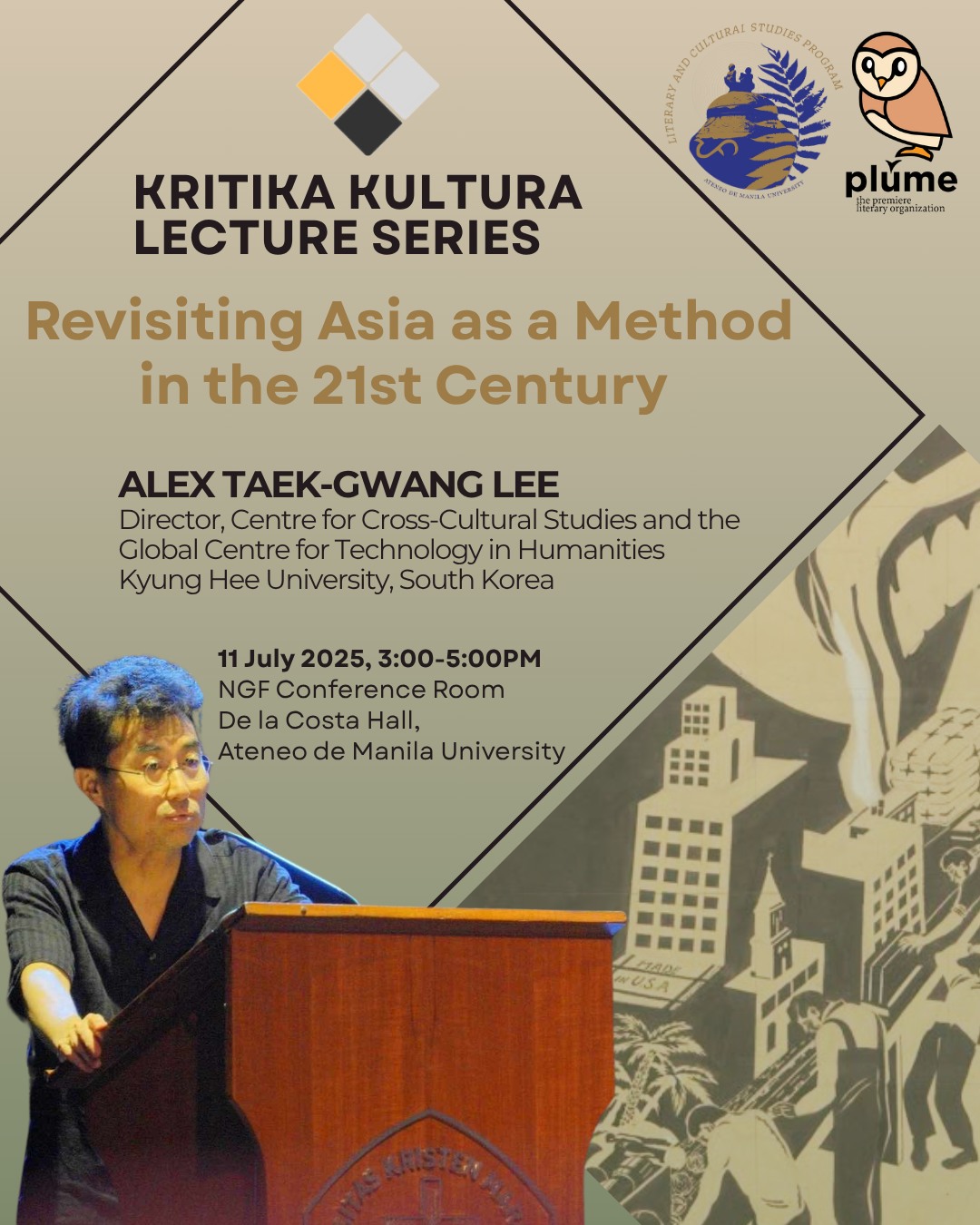
Call for Submissions: Kritika Kultura 48 Literary Section
Kritika Kultura is accepting contributions to its literary section, for possible inclusion in its forthcoming installments, beginning with the 48th issue (Nov. 2025).
Writers may submit any one of the following for consideration:
Kritika Kultura is interested in unpublished works in English. We also publish translations into English. For such submissions, translators are asked to submit the following additional requirements on top of the translation:
Though there is no theme to the literary section, Kritika Kultura is interested in works that reckon with the traditions and contemporary practices of their genre, as well as with the ongoing critical discourses of their thematic preoccupations. Because of this, Kritika Kultura invites contributors to submit alongside their submission an author’s note (100 to 200 words) which introduces their submission. Any relevant combination of the following may be discussed:
The author’s note will be given to the referees assigned to the work such that evaluation is informed by the author’s vision. Should the work be accepted for publication, the author’s note will be published alongside the literary work.
Submission Guidelines
Please email your original and unpublished contribution to the literary section of Kritika Kultura to kkliterary@gmail.com(cc: kk@ateneo.edu). Simultaneous submission is permitted, but Kritika Kultura must be notified immediately if the work is accepted or published elsewhere.
Please make sure your submission follows this format:
You will receive an acknowledgment of your submission within two weeks. As Kritika Kultura strictly has works reviewed by at least two external referees, we hope to provide news on the status of your submission within two months. If you would like your work to be possibly included in the 48th issue, please submit by July 31, 2025.
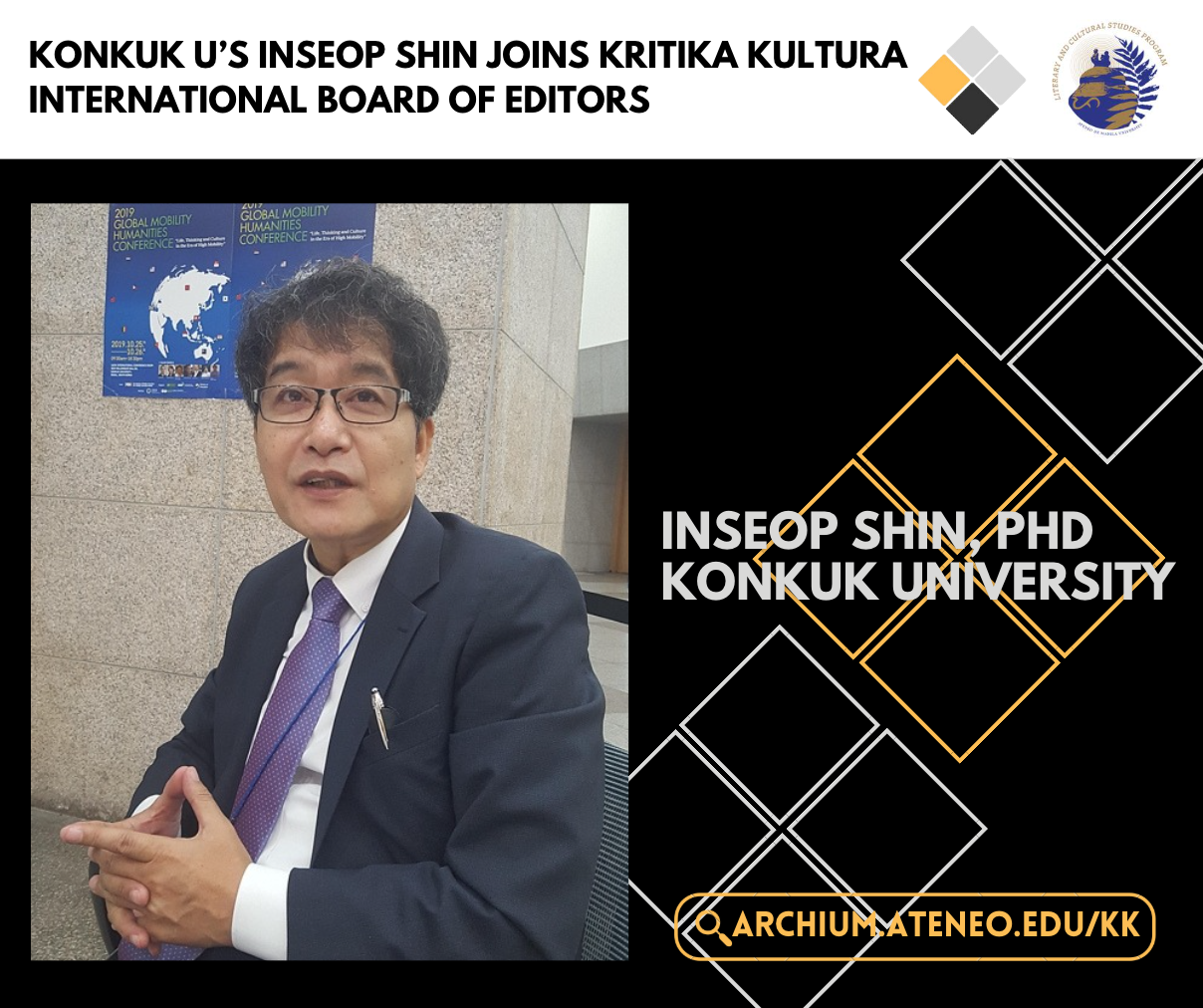
Konkuk University’s Inseop Shin Joins KK International Board
Kritika Kultura welcomes Professor Inseop Shin of Konkuk University (KU) to its distinguished International Board of Editors.
Dr Shin is Professor of Literature and Director of the Academy of Mobility Humanities at KU. He is respectively editor in chief and co-editor in chief of Scopus-indexed Mobility Humanities and KCI-indexed International Journal of Diaspora & Cultural Criticism, which are published by his university, and is an advisory board member of A&HCI-indexed International Studies of Literature, which is based at Zhejiang University. He is also the head of Human Korea 3.0 (HK3.0), a project of the Ministry of Education and the National Research Foundation of Korea aimed at supporting the country’s world-class research institutes in the humanities. His numerous publications include Light and Dark of Modern and Contemporary Japanese Literature (2009), which received recognition as an excellent academic book from the Korea Publishing Foundation.
Dr Shin is also a longtime partner of Kritika Kultura. “It was Prof. Shin,” says editor emerita Professor Maria Luisa Torres Reyes, “who has made Kritika Kultura an active partner of Konkuk University through the research centers he has led as director over the years. He has been published in Kritika Kultura on relevant topics like diaspora and mobility humanities.” His articles that appear in KK include “A Narrative of Those on the Move: The Case of Takeo Arishima” (No. 28), “Mobility in the Work of Haruki Murakami, Focusing on Dance, Dance, Dance as a Narrative of Mobility” (No. 36), and “The Island Literature Museum of Korea” (No. 43).
With this development, Dr Shin is the third scholar based in South Korea to become a member of KK’s International Board of Editors, joining Professors Joel David of Inha University and Alex Taek-Gwang Lee of Kyung Hee University. “Dr Shin brings to KK his knowledge of, among others, Japanese literature, diaspora studies, mobility studies,” says KK editor in chief Dr Vincenz Serrano. “We look forward to developing our collaboration with Dr Shin and his colleagues in Konkuk University.”
Indexed in the MLA International Bibliography, Arts and Humanities Citation Index (Clarivate), Scopus, EBSCO, the Directory of Open Access Journals, and the International Consortium of Critical Theory Programs, KK is published thrice a year by the Literary and Cultural Studies Program of the Ateneo de Manila University. For updates on future events and publication prospects, visit archium.ateneo.edu/kk.
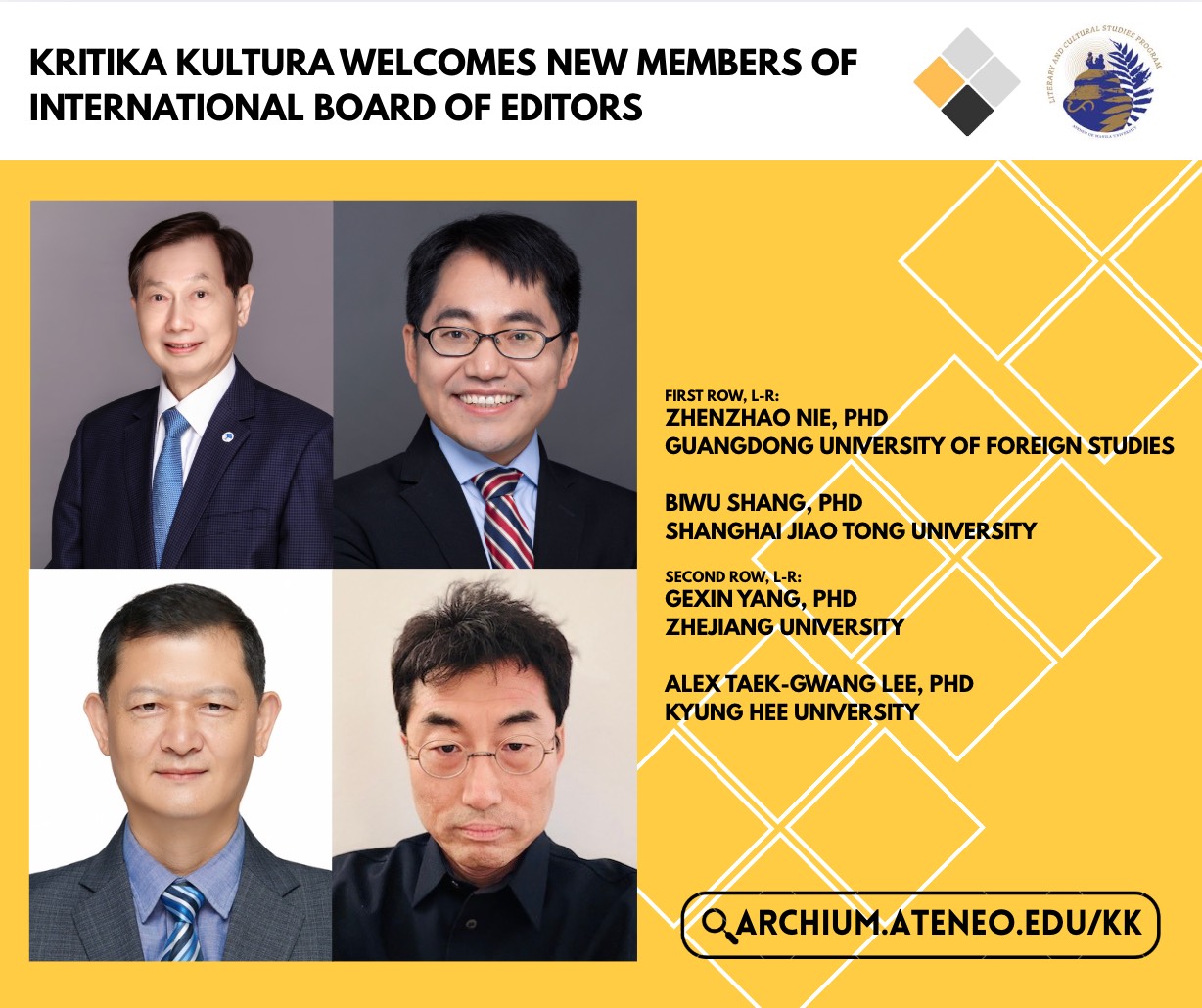
KK Welcomes New International Board Members
Kritika Kultura welcomes the new members of its esteemed International Board of Editors, Professors Zhenzhao Nie of Guangdong University of Foreign Studies (GDUFS), Biwu Shang of Shanghai Jiao Tong University (SJTU), Gexin Yang of Zhejiang University (ZJU), and Alex Taek-Gwang Lee (KHU).
Dr. Nie is Professor and Yunshan Chair of World Literature and Languages at GDUFS and is the president of the International Association for Ethical Literary Criticism. Since 2022, he is emeritus professor at Zhejiang University, where he was distinguished professor and founding director of the Institute for Interdisciplinary Studies of World Literature. He is also an international fellow of the British Academy and a foreign member of the Academia Europea. He has been consistently recognized by Elsevier as one of the most cited Chinese researchers and is among the world’s top two percent in the scientists list of Stanford University.
Dr. Shang is Distinguished Professor of English at SJTU. He is the editor in chief of Frontiers of Narrative Studies (De Gruyter) and the author of Unnatural Narrative Across Borders: Transnational Perspectives (Routledge), What Is Narratology (Shanghai Foreign Language Education P), Contemporary Western Narratology: Postclassical Perspectives (People’s Literature P), and In Pursuit of Narrative Dynamics: A Study of James Phelan’s Rhetorical Theory of Narrative (Peter Lang) as well as over forty internationally published papers on ethical literary criticism, contemporary fiction, and narratology. He joined Academia Europa in 2018 as an elected member.
Dr. Yang is Professor of English and Comparative Literature in the School of International Studies and Director of Institute for Interdisciplinary Studies of World Literature at ZJU. He is also associate editor of Interdisciplinary Studies of Literature and Forum for World Literature Studies and secretary general of International Association for Ethical Literary Criticism.
Dr. Lee is Professor of Philosophy and Cultural Studies at KHU, where he also directs the Center for Cross-Cultural Studies and the Global Center for Technology in Humanities. He has held visiting positions in the Czech Republic, the United Kingdom, and the Philippines. He served as academic advisor for the 2017 Gwangju Biennale and as program manager for the 2021 Venice Biennale of Architecture. His publications include The Idea of Communism 3 (Verso, co-edited with Slavoj Zizek), Deleuze, Guattari, and the Schizoanalysis of Postmedia (Bloomsbury, co-edited with Joff PN Bradley and Manoj NY), Communism After Deleuze (Bloomsbury), and Colors of the Concepts: Philosophers on Paintings (Anthem P), and his latest book Made in Nowhere: Essays on the Asiatic Modes of Existence (Sublation P) is forthcoming this May.
“Kritika Kultura is pleased to have on board Professors Nie, Shang, Yang, and Lee, who are all leading lights in the field of literary and cultural studies. Their continuing participation in, and abiding support of, Kritika Kultura’s activities is a signal that the journal will move from strength to strength, particularly in the professors’ areas of expertise such as, but not limited to, critical theory, narrative studies, ethical literary criticism, and world literature. I am excited to see what Kritika Kultura and our new board members can do to advance knowledge production in the region,” says KK editor in chief Vincenz Serrano. Since its foundation in 2002 by Professor Maria Luisa Torres Reyes, KK continues to be a leader in the publication of the latest studies in literature, language, and culture. It is indexed in the MLA International Bibliography, Arts and Humanities Citation Index (Clarivate), Scopus, EBSCO, the Directory of Open Access Journals, and the International Consortium of Critical Theory Programs and is now published thrice a year by the Literary and Cultural Studies Program of the Ateneo de Manila University. For updates on future events and publication prospects, visit archium.ateneo.edu/kk.
An Archipelagic Turn and the “Other Asia”: Literature, Politics, Culture
August 4-6, 2025 Jeju National UniversityKeynote: Gayatri Spivak, Columbia University, US
The Critical Island Studies Consortium announces a conference that aims to fundamentally challenge and reconceptualize our understanding of “Asia” by privileging an archipelagic perspective over the dominant continental narrative. In an era where global power dynamics increasingly revolve around Asia, we propose a radical reframing of how we understand this region. and its place. The persistent continental bias in interdisciplinary scholarship, particularly endemic in certain disciplines like Asian Studies, has created a fundamental misrepresentation of regional identity and relations. This conference proposes a radical epistemological shift: understanding Asia primarily through its archipelagic character rather than its continental mass. While traditional scholarship has positioned Northeast Asian continental powers as the center of “Asia,” this framework has obscured the rich, complex networks of maritime connections, island cultures, and archipelagic relations that have historically defined and continued to shape the region.
Our theoretical foundation draws from multiple critical thinkers who have challenged continental-centric epistemologies. As Gayatri Chakravorty Spivak says, “we cannot turn planetarity into the production of an adjective for ourselves.” There is an ever-present risk that a global, all-encompassing representation or worldview might create its distorted reality, detached from the physical world. In constructing such overarching narratives, we may overlook the Earth itself, echoing the concerns and anxieties expressed by modernist thinkers. The imperative of our planet demands that we rethink its essence. Édouard Glissant’s assertion that “the archipelagos of the Mediterranean must encounter the archipelagos of Asia” suggests that archipelagic thinking offers an alternative perspective but an on the ontological condition of our contemporary world. This vision challenge resonates with Gilles Deleuze’s ontology of islands, which understands archipelagic spaces as existing in the productive tension between separation and connection, between continent and ocean. This ambiguous position—simultaneously yearning for separation from the mainland while maintaining complex networks of connection—offers rich theoretical ground for reconceptualizing the basic concepts and categories in interdisciplinary scholarship particularly in relation to Asia, viewed in a historical context of Asian Studies.
The name “Asia” itself reveals the problematic nature of continental-centric thinking. Originally denoting regions outside the Roman Empire before being transformed into a signifier for Greater China, it represents an arbitrary geopolitical categorization that reflects Western imperial interests rather than regional realities. The post-war Cold War system further entrenched this continental bias, dividing what was once an interconnected maritime world according to Western strategic interests. This historical context demands a fundamental rethinking of how we approach conceptualize Asian Studies. We recognize that islands are not peripheral to Asia but constitute its essential character—a reality that continental-centric narratives have systematically marginalized.
This marginalization has not only distorted our understanding of the past but continues to shape contemporary geopolitical and economic frameworks in ways that privilege continental perspectives.
The conference seeks to develop several critical theoretical interventions through archipelagic ontology, maritime epistemologies, and island agency. First, we aim to explore the nature of archipelagic existence beyond continental frameworks, understanding the relationship between isolation and connection, and developing new conceptual tools for archipelagic thinking. Second, we seek to center maritime networks as primary rather than secondary phenomena, developing knowledge systems that emerge from archipelagic experiences and challenging land-based assumptions in knowledge production. Third, we propose reconceptualizing islands as active agents rather than passive spaces, understanding island-mainland relations beyond dependency frameworks, and exploring island-based forms of resistance and creativity.
Through these interventions, we address crucial questions: How might we understand Asia differently if we prioritize archipelagic perspectives over continental ones? What alternative histories emerge when we center maritime networks and island experiences? How does an archipelagic framework challenge current geopolitical and economic paradigms? What new methodologies are required for archipelagic thinking? These questions demand innovative methodological approaches that privilege island perspectives and incorporate indigenous knowledge systems into archipelagic methodologies.
The conference aims to establish archipelagic thinking as a fundamental approach in the field to Asian Studies, that could help develop new methodological tools for island-centered research, create networks of scholars committed to archipelagic perspectives, and produce publications shaping future research agendas. We seek to foster dialogue between island-based and continental scholars, working toward a more sophisticated incisive and inclusive understanding of Asian histories, cultures, and futures.
We particularly welcome papers that explicitly challenge continental-centric approaches through archipelagic frameworks, by engaging with but not limiting to any of these topics:
- Theoretical Interventions
- Critiques of continental-centric Asian Studies
- Archipelagic methodologies and epistemologies
- Maritime networks as alternative organizing principles
- Island ontologies and their implications for regional understanding
- Historical Reconfigurations
- Pre-colonial maritime networks and their disruption
- Alternative histories centered on island experiences
- Maritime trade networks as primary rather than secondary phenomena
- Island-based resistance to continental hegemony
- Contemporary Implications
- Rethinking geopolitics through archipelagic frameworks
- Island economies as alternatives to continental capitalism
- Maritime sovereignty and territorial reconceptualization
- Environmental challenges from archipelagic perspectives
- Cultural Dynamics
- Island-based cultural formations and their resistance to continental narratives
- Maritime cultural networks and their contemporary relevance
- Indigenous knowledge systems and their challenge to continental epistemologies
- Archipelagic arts and literature
Submission Requirements
Abstracts should explicitly address how their research challenges continental-centric approaches and contributes to archipelagic understanding of Asia. We particularly encourage submissions from scholars based in or focusing on island territories.
- Abstract: 300-500 words
- Must include theoretical framework
- Must explicitly address continental/archipelagic dynamics
- Include five keywords
- Brief biographical note (150 words)
Important Dates
March 31, 2025
The deadline for the submission of an abstract and a short bio
April 15, 2025
Authors will be notified via email
Selected papers will be considered for a volume on archipelagic perspectives and approaches, aiming to establish this framework as a significant intervention in the field.
Organizers:
Critical Island Studies Consortium, https://criticalislandstudies.com
Research Institute for the Tamla Culture (Jeju National Univ.), https://tamla.jejunu.ac.kr
Center for Cross-Cultural Studies (Kyung Hee Univ.), https://ccs.khu.ac.kr/?language=eng
SNU American Studies Institute (Seoul National Univ.), https://amstin.snu.ac.kr/en/
Contact
Alex Taek-Gwang Lee alextglee@gmail.com
Lulu Reyes lu2reyes3x@gmail.com
References
Deleuze, Gilles. Desert Islands: and Other Texts, 1953–1974. Tran. Mike Taormina. New York: Semiotext(e), 2004.
Glissant, Édouard. The Baton Rouge Interviews. Trans. Kate M. Cooper. Liverpool: Liverpool University Press, 2020.
Spivak, Gayatri Chakravorty and Susanne M. Winterling. “The imperative to make the imagination flexible.” Planetary Sensing https://planetarysensing.com/the-imperative-to-make-the-imagination-flexible/
Call for Papers: FORUM KRITIKA ON POST-HAIYAN ECOLOGIES
This forum on Post-Haiyan ecologies attempts to describe the rise of creative and critical work on memory, trauma, and the environment after Typhoon Haiyan in 2013. The idea of “post-Haiyan” was primarily articulated by Waray poet and scholar Antonino Salvador De Veyra (2021) to describe a poetic movement within the region that grapples with the incomprehensibility of a trauma and the demanding task of working-through. Turning to Stuart Hall (2017), the marking “post” does not merely categorize subjectivities, trauma, and narratives within a historical time frame but rather generates a temporal succession and consciousness that thrive and struggle with the shadows of a catastrophe (Claros 2024). Furthermore, the forum is also conscious of the limits of periodization such as that of the Anthropocene and Capitalocene which easily slips into “cynicism, defeatism, and self-certain and self-fulfilling” discourses (Haraway 2016, 56; See Hayot 2011). In keeping with this, we seek interdisciplinary papers that raise questions on ecocritical periods and models without losing sight of the present urgency of environmental decline. In terms of scope, post-Haiyan exceeds geographical boundaries of Eastern Visayas by inaugurating a global dialogue between tropic and temperate zones that come to witness emerging cultures of disaster.
Ten years after supertyphoon Yolanda, internationally called Haiyan, ravaged Eastern Visayas and nearby regions, discourses on disaster, trauma, and the environment have pervaded literary and cultural production in the region. These productions have explored the intersections of human experience, artistic experimentation, and scholarly expertise–three words derived, quite interestingly, from the same Latin root, experiri, which means to test or to prove. The spate of films, literary texts, and scholarly work that came out in the wake of Haiyan attests to these latent signifying practices of a people making sense of a calamity of such magnitude. But what have these (re)productions proven so far in terms of articulating multispecies-environment relations, climate justice, and communal healing in the Anthropocene? Writing in The Three Ecologies, Felix Guattari maintains: “The only true response to the ecological crisis is on a global scale, provided that it brings about an authentic political, social, and cultural revolution, reshaping the objectives of the production of both material and immaterial assets” (2000, p.28). He then posits an ecosophical framework that accounts for environmental, social, and mental ecologies that reveal relationships between the human and nonhuman and how such an understanding of these relations contribute to a more coherent account of the crisis and its possible solutions. The present situation calls for the supplementation of scientific objectivity, the bedrock of any investigation of ecosystems, with experiential and psychological subjectivities which humanistic inquiry can bring to light. At its most basic, this requires a conversation between the sciences and the humanities, or as Neil Evernden contentiously puts it, “environmentalism without aesthetics is merely regional planning” (1978, 20).
This forum engages with disciplines such as, but not limited to, memory and trauma studies, disaster politics, local and global histories, and environmental humanities - all of which commence an interpretative moment that both gestures toward resilience and responds to the urgency of climate change. The objective is to gather in one section an interdisciplinary and self-reflexive account of the last 10 years after Typhoon Haiyan within and beyond the Philippines. This forum also covers articles that critically explore post-Haiyan life and its representations as an opportunity of contact and comparison between and among regional and national borders.
Below are a range of topics which the forum intends to address:
- Environmental humanities
- Geocriticism and the anthropocene
- Indigenous environmental knowledge
- Island and archipelago studies
- Cultures and politics of disaster
- Local histories of disaster and resilience
- Trauma, memory, and working-through of Haiyan
- Cross-traumatic affiliations
- Theater and performance studies
- Climate trauma and literary studies
References:
Borrinaga, George. Solidarity and crisis-derived identities in Samar and Leyte, Philippines, 1565-present. 2019. University of Hull, PhD dissertation.
Braidotti, Rosi and Bignall, Simone, editors. Posthuman Ecologies: Complexity and Process of After Deleuze. Rowman & Littlefield Publishers, 2018.
Claros, Ian Harvey. “Queering the Troubled Tropics in Panx Solajes’ Post-Haiyan Short Films.” eTropic: electronic journal of studies in the tropics, vol. 23, no. 1, 2024, pp. 76-94.
Claros, Ian Harvey. “Tongues of Trauma: Narrating through Code-Switching Typhoon Haiyan in Daryll Delgado’s Remains.” Forum for Modern Language Studies, vol. 60, no. 1, 2024, pp. 1-15.
De Veyra, Antonino Salvador. “Ugmad: Storm Surges, Super Typhoons, and the Ecopoetry of Post-Haiyan Leyte and Samar, Philippine.” Journal of Southeast Asian Ecocriticism, vol. 1, no. 1, 2021, pp. 74-88.
Guattari, Félix. The Three Ecologies. Translated by Ian Pindar and Paul Sutton, Athlone P, 2000.
Haraway, Donna J. Staying with Trouble, Duke UP, 2016.
Kaplan, E. Ann. Climate Trauma: Foreseeing the Future in Dystopian Film and Fiction. Rutgers UP, 2016.
Lacuna, Isabela. “Kundiman and Catastrophe: The Torrential Aesthetics of the Folk Kundiman.” The Cordillera Review, vol. 12, no. 1, 2022, pp. 13-38.
Martin, Jocelyn. “The Wave, the Wound, and the Witness: Climate Trauma, Ethics, and Listening in Les Mains Lâchées.” Forum of World Literature Studies, vol. 11, no. 2, 2019, pp. 402-417.
Deadlines
Full Paper: April 15, 2025
Peer Review: August 1, 2025
Revised Paper: September 15, 2025
Target Publishing: First issue of 2026
Submissions and correspondence related to the Forum Kritika on Post-Haiyan Ecologies must be directed to the guest editors Ian Harvey A. Claros (iclaros@ateneo.edu) and Michael Carlo Villas (michaelcarlo.villas@vsu.edu.ph) (subject heading: Post-Haiyan Ecologies; cc kk@ateneo.edu)
KK 1 2024-2025 CFP Reading Fredric Jameson in Asia
Call for Papers: Forum Kritika on Reading Fredric Jameson in Asia: Marxism, Literature, and Postmodernism
Kritika Kultura, the online peer-reviewed international journal on literary and cultural studies, invites interested scholars to submit manuscripts to a Forum Kritika special section on the theme “Reading Fredric Jameson in Asia: Marxism, Literature, and Postmodernism.” It welcomes contributions from a broad range of interdisciplinary and theoretical perspectives deploying current or innovative methodologies to develop new insights into its theme.
In 2024, Fredric Jameson, the influential American literary critic and political theorist, passed away at the age of 90. His death prompted numerous retrospectives on his intellectual legacy across various publications. This Forum Kritika seeks to examine that legacy from perspectives coming from Asia highlighting often-overlooked aspects of Jameson’s work. In his career, “Asia” and the “Third World” played a palpable if often invisible role in shaping Jameson’s theory and criticism, a contribution that deserves greater recognition and analysis.
Even posthumously, Jameson remains a towering Marxist figure in contemporary critical theory whose work has profoundly influenced postwar Asian comparative literature and cultural studies. Known for his incisive analyses of postmodernism, capitalism, and cultural production, Jameson’s theories have resonated deeply within these fields, offering scholars robust frameworks for understanding the complex relationships between culture, ideology, and economic systems—particularly within the context of global capitalism. Central to his contributions is the concept of the “political unconscious,” which argues that all cultural texts are inherently ideological and must be interpreted in relation to their socio-economic contexts. This concept has become an essential tool for scholars analyzing literature and cultural artifacts, enabling them to uncover the deeper ideological underpinnings of cultural expressions.
Before World War II, part of the intellectual landscape of critical theory in Asia was heavily influenced by European philosophers such as Georg Lukács and Martin Heidegger, whose ideas eventually shaped the region’s intellectual discourse. However, the postwar era brought significant changes. The neo-colonial and decolonization processes and the formation of new nation-states in Asia led to the emergence of ethnographic and anthropological concerns, which were often accompanied by ideological distortions as nations struggled to define their postcolonial identities while grappling with the pervasive influence of Western thought. In this context, Jameson’s work has become historically significant. His critique of Western modernity, coupled with his insights into the global spread of capitalism, provided alternative frameworks that resonated with scholars seeking to understand the cultural and ideological shifts taking place in postwar Asia. The continued influence of pre-World War II literary studies in Asia likely contributed to the growing interest in Jameson’s theories, as scholars looked for new ways to engage with the complexities of the postwar world and struggled to define “World Literature” which had also been geopolitically carved-up by the Cold War.
The reception of Jameson’s work in Asia, however, has not been without challenges. In South Korea, for example, the stringent censorship of the Cold War era rendered much of Jameson’s work, especially his Marxist inclinations, politically unacceptable in its original form. Translations were often altered to remove references to Marxism or Lenin, reflecting the political sensitivities of the time. Despite these obstacles, Jameson’s ideas have had a lasting impact on Asian comparative literature and cultural studies. His work is particularly valued for its critique of capitalist culture and its provision of alternative critical perspectives on existing systems of representation, especially in the context of the U.S.-dominated postwar world order. Southeast Asia, including the Philippines and Indonesia, was equally inhospitable to Jameson’s works owing to the Cold War ideology that dominated the region in the wake of international upheavals like the war of liberation in Vietnam, the 1965 coup in Indonesia, and the Martial Law in the Philippines. With the introduction of new theoretical approaches in literary studies from European thinkers, literary studies in the Philippines began to take a critical turn in certain sectors of local intellectuals in academia. This turn moved away from the “formalist” and empirical bent of Anglo-American Criticism which dominated English and Literature departments. With the anti-fascist, anti-feudal, and anti-US imperialist calls of the mass movement fighting for national liberation, “activist” criticism broke open the dominant practice of “close reading” to the winds of history, which would plant the seeds for broadening the horizons of literary studies into critical theory and cultural studies. Erstwhile deep in Mao’s “Talks on the Yenan Forum on Literature” in the early 1970, activist criticism began to be inspired by theories from intellectuals and artists from other national liberation movements even as ideas started to be drawn from the “West,” like German and French philosophical ideas in general, and in particular, from Jameson’s Marxism and Form in the mid-1970s and eventually, to The Political Unconscious in the 1980s with his dialectical method, interpretive framework, and historical perspective, as the Marcos dictatorship began to teeter toward its end.
Nevertheless, Jameson’s exploration of the cultural logic of late capitalism has equipped Asian scholars with the tools to challenge dominant narratives and to investigate the intersections of global and local cultural dynamics. His influence remains potent as scholars continue to engage with his theories to better understand the complexities of postcolonial identity, cultural representation, and the ongoing impact of globalization.
Against this rich intellectual backdrop, this special issue aims to shed light on the theories of Jameson, whose 90th birthday is celebrated in 2024, from the vantage point of Asia. The construction of the postwar world system was deeply intertwined with U.S. dominance in the Asia-Pacific region, and the subsequent processes of globalization cannot be fully comprehended without considering the geopolitical dynamics involving Northeast and Southeast Asia. This issue seeks to explore how Jameson’s critical trajectory engages with these geopolitical realities and to assess the tangible impact of his theories on comparative literature, cultural studies, and the broad field of interdisciplinary studies across these regions.
We invite contributions that explore, but are not limited to, the following topics:
- The application of Jameson’s theories to the analysis of Asian literature and cultural artifacts.
- Jameson’s influence on the development of postcolonial theory in Asian contexts.
- The intersection of Jameson’s critiques of late capitalism with the socio-economic realities of Northeast and Southeast Asia.
- Comparative studies examining the reception of Jameson’s work across different Asian countries.
- The role of censorship and political climate in the translation and adaptation of Jameson’s Marxism in Asia.
- Case studies exploring how Jameson’s concept of the “political unconscious” has been used to analyse specific cultural texts in Asia.
- The relevance of Jameson’s discussion of postmodernism to contemporary Asian cultural production.
- The possibilities and limits of Jameson’s critical theory in the understanding Asia’s historical and cultural diversity, specificity, and complexity.
We welcome submissions that engage with these themes and contribute to a deeper understanding of Fredric Jameson’s impact on Asian comparative literature and cultural studies.
Timeline:
- December 31, 2024: submission of abstract (200 to 250 words) and a bionote (100 to 150 words). Authors whose abstracts are accepted will be informed by January 2025. Abstracts should be submitted to Maria Luisa Torres Reyes (lu2reyes3x@gmail.com) and Alex Taek-Gwang Lee (tglee@khu.ac.kr), cc kk@ateneo.edu. Use the subject heading Reading Jameson in Asia.
- April 30, 2025: deadline of completed manuscript; manuscripts (7,000 to 8,000 words) should be in MLA 9th ed, and be submitted in a Microsoft Word file.
- May to August 2025: evaluation and revision period
- September 2025: deadline of final version of articles
- October 2025: production work
- Target publication date: November 2025
Maria Luisa T. Reyes Alex Taek-Gwang Le
lu2reyes3x@gmail.com tglee@khu.ac.kr
University of Santo Tomas Kyung-Hee University
Manila, Philippines Seoul, South Korea
PUBLICATION ANNOUNCEMENT: KK 44 and New Website
The editors of Kritika Kultura are delighted to announce the publication of its 44th issue (July 2024) and its new website. Composed of ten entries, KK 44 may now be read on Archium (archium.ateneo.edu/kk).
The regular section, edited by Ma. Gabriela P. Martin and Jocelyn Martin, has four articles. It includes “Green Buddhism’ and W.S. Merwin’s Eco-poetry” by Jiyong Gen and Jie Zhang, “Give My Heart Ease: Filiality and Responsibility in Clarissa in Light of Levinasian and Confucian Ethics” by Ying Xiong, “Photographic Power: Scenes from the United States and the Philippines” by Vicente L. Rafael, and “The Importance of Bearing Witness in Edwin Cameron’s Witness to AIDS (2005)” by Oscar Ortega Montero. These articles respectively delve into ecological interconnectedness, rejection of anthropocentrism, and importance of nature; conflicts and confluences between Levinasian and Confucian thought; the “dialectical workings of photographic images”; and the connections “between whiteness, privilege, and access to life-saving drugs” and their roles in the “on-going construction of democratic and transparent post-Apartheid South Africa.”
The New Scholars Forum features Nguyen Dang Huu’s ethnographic fieldwork and interviews among members of the Danang estuary in Central Vietnam. The work argues for “the importance of intersubjectivity, communication, and social interaction in the agency and transition of the sacred” and underscores the constancy of the sacred in human life.
The second part of Forum Kritika on Mobility in Islandic Geographies and Textual Representations in Literature, Culture, and Media Forms brings together a batch of articles from the 2023 Global Mobility Humanities Conference held at Konkuk University (Seoul, ROK). Guest edited by Maria Luisa Torres Reyes and Luisa L. Gomez, the forum publishes “YouTube Digital Storytelling of Korean Uninhabited Islands” by Jooyoung Kim, “A Phenomenological Study of Islandness as a Global Sense of Place: Focusing on the Animated Film Moana” by Taehee Kim, and “The Geopolitical Configuration of Okinawa in Post-War Japan: Focusing on Tatsuhiro Oshiro’s The Cocktail Party” by Yeonhee Woo. In their introduction, Reyes and Gomez underscore the intersection between island studies and mobility studies, an emerging interdiscipline that promises to trace how “historical, cultural, political, and digital forces shape the experiences and representations of island inhabitants in dynamics that are multiple and complex” as illustrated by the authors in their respective analyses of digital representations of uninhabited islands; the islandic sense of place, which may be located between “isolation and connectedness;” and the literary indexing of fraught geopolitical history of islands.
Completing KK 44 is the literary section edited by Martin Villanueva, which features “Water Memory” by Jessa C. Suganob. The work interfuses personal history, engagements with photography, and a reflection on the hazards of climate change deforestation in Misamis Oriental.
The editors are also pleased to inform the contributors and readers of Kritika Kultura that the old issues (i.e., KK 1 to 43) will also be available soon on the new website (archium.ateneo.edu/kk). For inquiries, please contact the editors at kk@ateneo.edu. Acknowledged by Asian and Asian American Studies libraries and scholarly networks, Kritika Kultura is indexed in the MLA International Bibliography, Arts and Humanities Citation Index (Clarivate), Scopus, EBSCO, the Directory of Open Access Journals, and the International Consortium of Critical Theory Programs (ICCTP). Kritika Kultura is published thrice a year by the Literary and Cultural Studies Program in the School of Humanities, Ateneo de Manila University and is a founding member of the Asian Journals Network.


